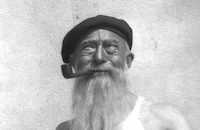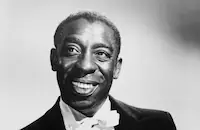The Last Parade
Cast & Crew
Erle C. Kenton
Jack Holt
Tom Moore
Constance Cummings
Robert Ellis
Gaylord Pendleton
Film Details
Technical Specs

Synopsis
When reporter Cookie Leonard covers a parade of men going to sign up to fight in World War I, he tricks his best friend, policeman Mike O'Dowd, into joining the army. Mike returns the "favor," and soon they are fighting side by side in France. Mike is injured during a battle and becomes trapped on a barbed wire fence. Despite the danger, Cookie rescues him and loses an eye when he is wounded. The friends convalesce in a makeshift hospital under the care of American nurse Molly Pearson, with whom they fall in love. Molly maintains platonic friendships with both men, and at the war's end, the trio return to the United States. While Mike is welcomed back to his job, Cookie is callously told that there is no room for him at the newspaper. The embittered Cookie avoids Mike and Molly while searching fruitlessly for a job, until finally he is hired as a driver by gangster A. C. Marino, after Marino witnesses his skill in a fistfight. Cookie is not content to stay a driver, however, and muscles in on Marino's bootlegging business. Within a year, Cookie has amassed a small fortune, opened a nightclub and acquired a notorious reputation. Cookie re-establishes contact with Molly and Mike, who is now a detective, over dinner at his club. Also attending is Molly's brother Larry, a reporter who has been investigating Marino. Marino threatens to kill Larry, but Cookie warns him to leave the youngster alone. Cookie then proposes to Molly, but she tells him that she will not marry him until he gets out of the racket. Later that night, Molly tells Mike that she loves Cookie, and despite his disappointment, Mike promises to try to help Cookie go straight. The next day, Larry ignores Cookie's advice to lay off Marino and prints a big story on the gangster. Marino's men kidnap Larry, and when Cookie rescues him, he kills Marino's right-hand man, Joe Pigano, in self-defense. Mike arrives on the scene and attempts to cover up his friend's guilt, but Larry again breaks the story. Mike warns Cookie that he has been promoted to chief of homicide and can no longer let their friendship interfere with his duties. Molly also gives Cookie an ultimatum when she tells him that unless he quits bootlegging and joins her and Mike in the next day's Armistice Day parade, she will never see him again. Cookie leaves in a huff, but returns the next day and joins his pals in the parade. He and Molly go to his nightclub, where he is finishing his preparations to leave when Marino's mugs deliver Larry's body. Cookie then rushes to Marino's headquarters and kills the gangster. Mike arrives and arrests his friend, who is then imprisoned and sentenced to die. On the day of his execution, Cookie asks the warden if Mike and Molly can accompany him down the corridor to the electric chair, and the three pals then link arms and walk in Cookie's last parade.

Director
Erle C. Kenton
Cast

Jack Holt
Tom Moore

Constance Cummings
Robert Ellis
Gaylord Pendleton
Jess De Vorska
Robert Graham
Gino Corrado
Earle D. Bunn
Vivi
Ed Le Saint

Edmund Breese

Clarence Muse
Crew

Film Details
Technical Specs

Quotes
Trivia
Notes
According to the Variety review, this was the first Columbia film produced by Jack Cohn, who was substituting briefly for his brother Harry while he was on the West Coast. According to the MPAA/PCA Collection at the AMPAS Library, MPPDA President Will H. Hays, concerned about the impact of various gangster films, asked policeman August Vollmer to view and comment on this and five other pictures. Vollmer responded that he saw nothing in the film that would incite crime or ridicule law, and noted that, "pictures of this type should have a tendency to create respect for law enforcement officials." This picture bears a striking resemblance in plot to End of the Trail, a 1936 Columbia production that also was directed by Erle C. Kenton and starred Jack Holt, although the credited writers differ. Columbia remade the picture in 1944 as The Racket Man, which was also based on Casey Robinson's story. It was directed by D. Ross Lederman and starred Tom Neal.












